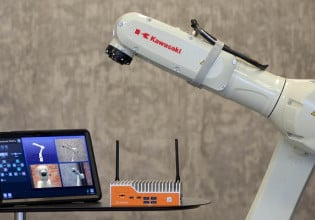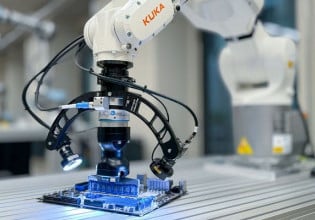M
Michael Batchelor
> The "Quickbooks" style thing will NOT work out for pre-canned packages - even in specific industries. This has already proven to fail. Consider works like RS Batch. <
Agreed. For a single machine vendor, who can supply a "standardized" product, there may be something they can offer once it's customized. Consider a curing oven manufacturer. They may deliver 75 ovens a year of a particular type which have 5-10 optional components. I can see how a
product with a template tool like Factory Link uses would allow them to roll out a slick interface that appears "customized" to the end user. However, there's a boatload of engineering that goes into creating that template beforehand. And again, this is more of a tool for someone like
a field installer, not an ERP interface.
I have yet to see an automotive assembly cell that was "standardized" enough to try something like this.
> Standardization and "cookie cuttering" the tricky programmatic aspects is possible - intercommunication, remote access, error handling, a stable platform to run on 24x7, etc. <
In theory, much of this should be handled in the "control libraries" for the IDE add-in components. In practice, it isn't so clean.
> I think general purpose software developers usually don't make efficient industrial application creators, given that they're used to other types of development and not dealing with industrial control. <
I think this will change over time. We will not win the battle with IT so long as shipping production off to a place where it is cheaper to pay labor to so the work than to automate to do the work. We *MUST* necessarily make them into people who understand that keeping the machine running is paramount. I don't care if you think this is a "cross to bear" or an "ax to grind," we have to accept it as our lot. (Jeez, that sounds fatalistic. Note to self: Find a better way to say that to a CIO.)
> IMO the convergence reinforces the wrench turner's need to be able to put a button on the screen and necessitates the IT guy's need to be able to control remote access to the plant. <
One of our standard internal admonishments of the past few years has been that with a properly designed and implemented troubleshooting system on the interface, there is no for the wrench turner to ever put a button on the screen. Unfortunately, this is a lot harder to pull off on a one-off implementation than it is when you're making ten thousand of the same product. It's very difficult to foresee everything that can go wrong with the machine.
> It may yield a few USB Swiss Army Knife totin' superheros <
Yeah, but superheroes always come with a kryptonite heel. Some people love the role, but it's far better if Fred Flintstone can get the machine running again. At least, that's what we should strive for.
> The "Future HMI" will certainly have flexibility characteristics of a general purpose IDE, but will necessarily be MUCH SIMPLER. I could see it evolving out of an existing HMI growing in programmability OR a custom version of an IDE that simplifies and specializes for industrial apps. <
Time will tell what the final result is, but regardless, I'll stand by the line I wrote below. Change is coming. We can either get along or get
run over.
--
Michael Batchelor
www.IndustrialInformatics.com
Agreed. For a single machine vendor, who can supply a "standardized" product, there may be something they can offer once it's customized. Consider a curing oven manufacturer. They may deliver 75 ovens a year of a particular type which have 5-10 optional components. I can see how a
product with a template tool like Factory Link uses would allow them to roll out a slick interface that appears "customized" to the end user. However, there's a boatload of engineering that goes into creating that template beforehand. And again, this is more of a tool for someone like
a field installer, not an ERP interface.
I have yet to see an automotive assembly cell that was "standardized" enough to try something like this.
> Standardization and "cookie cuttering" the tricky programmatic aspects is possible - intercommunication, remote access, error handling, a stable platform to run on 24x7, etc. <
In theory, much of this should be handled in the "control libraries" for the IDE add-in components. In practice, it isn't so clean.
> I think general purpose software developers usually don't make efficient industrial application creators, given that they're used to other types of development and not dealing with industrial control. <
I think this will change over time. We will not win the battle with IT so long as shipping production off to a place where it is cheaper to pay labor to so the work than to automate to do the work. We *MUST* necessarily make them into people who understand that keeping the machine running is paramount. I don't care if you think this is a "cross to bear" or an "ax to grind," we have to accept it as our lot. (Jeez, that sounds fatalistic. Note to self: Find a better way to say that to a CIO.)
> IMO the convergence reinforces the wrench turner's need to be able to put a button on the screen and necessitates the IT guy's need to be able to control remote access to the plant. <
One of our standard internal admonishments of the past few years has been that with a properly designed and implemented troubleshooting system on the interface, there is no for the wrench turner to ever put a button on the screen. Unfortunately, this is a lot harder to pull off on a one-off implementation than it is when you're making ten thousand of the same product. It's very difficult to foresee everything that can go wrong with the machine.
> It may yield a few USB Swiss Army Knife totin' superheros <
Yeah, but superheroes always come with a kryptonite heel. Some people love the role, but it's far better if Fred Flintstone can get the machine running again. At least, that's what we should strive for.
> The "Future HMI" will certainly have flexibility characteristics of a general purpose IDE, but will necessarily be MUCH SIMPLER. I could see it evolving out of an existing HMI growing in programmability OR a custom version of an IDE that simplifies and specializes for industrial apps. <
Time will tell what the final result is, but regardless, I'll stand by the line I wrote below. Change is coming. We can either get along or get
run over.
--
Michael Batchelor
www.IndustrialInformatics.com






